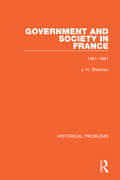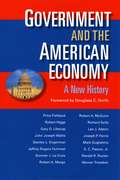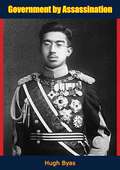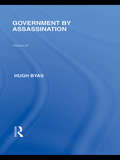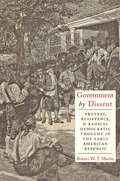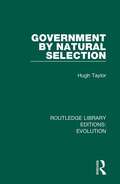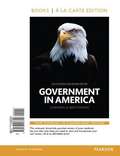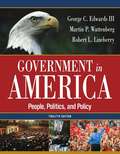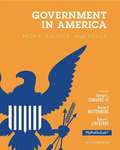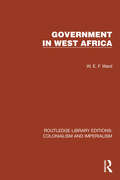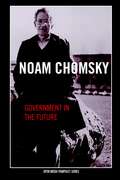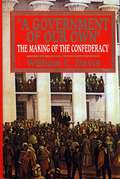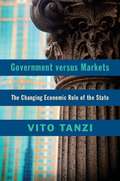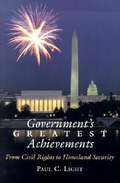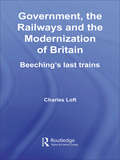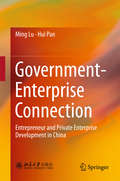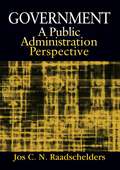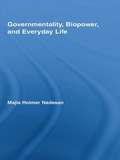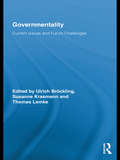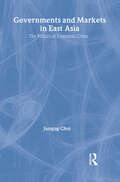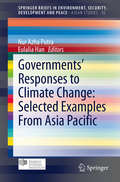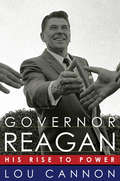- Table View
- List View
Government and Society in France: 1461-1661
by J. H. ShennanOriginally published in 1969, this volume provides a lucid analysis of French government and society over two centuries, from the late medieval period to the beginning of Louis XIV’s personal rule. It takes up the essential arguments, contributes some novel interpretations, challenges some assessments, and makes essential reading for anyone trying to study the history of early modern France.
Government and the American Economy: A New History
by Price V. FishbackThe American economy has provided a level of well-being that has consistently ranked at or near the top of the international ladder. A key source of this success has been widespread participation in political and economic processes. In The Government and the American Economy, leading economic historians chronicle the significance of America’s open-access society and the roles played by government in its unrivaled success story. America’s democratic experiment, the authors show, allowed individuals and interest groups to shape the structure and policies of government, which, in turn, have fostered economic success and innovation by emphasizing private property rights, the rule of law, and protections of individual freedom. In response to new demands for infrastructure, America’s federal structure hastened development by promoting the primacy of states, cities, and national governments. More recently, the economic reach of American government expanded dramatically as the populace accepted stronger limits on its economic freedoms in exchange for the increased security provided by regulation, an expanded welfare state, and a stronger national defense.
Government by Assassination (Routledge Library Editions: Japan Ser.)
by Hugh ByasHERE IS THE TRUTH ABOUT THE PATRIOTIC MURDER SOCIETIES, THE ARMY GANGSTERS, THE ARMY’S IDEA OF JAPAN’S DESTINY, AND THE STRANGE ROLE OF THE EMPEROR.In Japan the army possesses a kind of autonomy which immunizes it from control by any other agency. Long ago, Mr. Byas saw that the intoxication of this immunity would lead to war, and so he spent many years ferreting out from the secretive Japanese how the militarists gained their fantastic power.His book therefore is to Japan what Rauschning’s Revolution of Nihilism was to Germany. Starting from the grass-roots of Japanese politics, it moves steadily toward the amazing disclosure of principles. At bottom, the Japanese Army is closely allied with gangsterism. The so-called patriotic societies which do its dirty work are nothing more than leagues of murderers, blackmailers, and thieves. Byas shows how these terrorists made contact years ago with certain groups of appreciative younger officers, and how consequently almost every civilian leader who curbed the army’s power was assassinated.Mr. Byas then asks what the basic program and philosophy of such a power group can be; and shows that it is aggression abroad and reaction at home. Japan was to become a war machine. 80% of its product was to go to the army, and the people were to live on the balance. The efficient planning and centralization of Marxism were to be used, but stripped of the hated component of democracy. Japan, like Germany, believes that it is a nation with a destiny, and that war pays. The furious Japanese egomania is centered in the Emperor and the notion of his divine descent. Mr. Byas therefore devotes several chapters to the hocus-pocus that surrounds this personage. He ends with a powerful and clear-headed discussion about the future.
Government by Assassination (Routledge Library Editions: Japan)
by Hugh ByasWritten by someone who spent twenty-three years as a journalist in Japan, this book describes the political and military aspirations of Japan at a tumultuous period of twentieth century history. The book examines the workings of the Japanese government and discusses the role of the military in shaping political ideals: ideals which were a compound of Marxism and National Socialism, transformed for Japanese uses and combined with fanatical racial, national and semi-religious obsessions.
Government by Dissent: Protest, Resistance, and Radical Democratic Thought in the Early American Republic
by Robert W.T. Martin"The most thorough examination we have of how early Americans wrestled with what types of political dissent should be permitted, even promoted, in the new republic they were forming. Martin shows the modern relevance of their debates in ways that all will find valuable—even those who dissent from his views!"—Rogers M. Smith, Christopher H. Browne Distinguished Professor of Political Science, University of Pennsylvania Democracy is the rule of the people. But what exactly does it mean for a people to rule? Which practices and behaviors are legitimate, and which are democratically suspect? We generally think of democracy as government by consent; a government of, by, and for the people. This has been true from Locke through Lincoln to the present day. Yet in understandably stressing the importance—indeed, the monumental achievement—of popular consent, we commonly downplay or even denigrate the role of dissent in democratic governments. But in Government by Dissent, Robert W.T. Martin explores the idea that the people most important in a flourishing democracy are those who challenge the status quo. The American political radicals of the 1790s understood, articulated, and defended the crucial necessity of dissent to democracy. By returning to their struggles, successes, and setbacks, and analyzing their imaginative arguments, Martin recovers a more robust approach to popular politics, one centered on the ever-present need to challenge the status quo and the powerful institutions that both support it and profit from it. Dissent has rarely been the mainstream of democratic politics. But the figures explored here—forgotten farmers as well as revered framers—understood that dissent is always the essential undercurrent of democracy and is often the critical crosscurrent. Only by returning to their political insights can we hope to reinvigorate our own popular politics.
Government by Natural Selection (Routledge Library Editions: Evolution #13)
by Hugh TaylorOriginally published in 1915, Government by Natural Selection looks at the historical advancement of government through the lens of the Darwinian theory of natural selection. The book examines the history of government and its formation, right up until the early 20th century, when the book was first published. The book suggests that there is a link between Darwinian theory and the development of humans in societies, and that this in turn affected the formation of government over the course of history. The book uses not only Darwinian theory to examine history and the formation of government, but philosophers from both antiquity and the 19th century. This book provides a fascinating examination of politics and history through the application of science, and will be of interest to anthropologists, historians and academics of politics alike.
Government by the People (Twenty-Second Edition)
by Paul C. Light David B. Magleby David M. O'Brien J.W. Peltason [et al.]Building on decades of authoritative scholarship, this completely updated text continues to offer accessible, carefully crafted, and straightforward coverage of the foundations of American politics, as well consistent focus on the achievements of a government by the people In an increasingly cynical world, GBTP emphasizes that politics matters and encourages, motivates, and even inspires students-with accounts of individual and collective acts of courageousness, intellect, and integrity in the political arena-to be effective and informed citizens. With each chapter now framed by nationally-selected learning objectives and chapter mastery self-tests, several compelling new features, and an all new contemporary design, this thoroughly updated Twenty-Third Edition continues in the book's long tradition for excellence. As we enter this very complex political era, there is no more reliable or more relevant text to help you advance your students from being simple onlookers to knowledgeable participants in the American political experience.
Government by the People: 2011 AP Edition
by Paul C. Light David B. Magleby Christine L. NemacheckThe new AP edition of Government by the People integrates the latest in scholarship on American politics and government, the 2010 midterm elections, recent Supreme Court appointments and decisions, and comparisons with countries around the world into a book that introduces you to the subject and the discipline of political science.
Government in America: People, Politics, and Policy
by Martin P. Wattenberg George C. Edwards2014 Elections and Updates Sixteenth Edition For courses in American Government
Government in America: People, Politics, and Policy (12th edition)
by Martin P. Wattenberg Robert L. Lineberry George C. Edwards IIIGovernment in America illustrates the impact that government has on the daily lives of each and every American, motivating students to become active participants in all aspects of our political culture, and helping overcome student apathy towards American Government.
Government in America: People, Politics, and Policy (Eleventh Edition)
by Martin P. Wattenberg Robert L. Lineberry George C. EdwardsPolitics matters. That is the core message of this book. The national government provides important services, ranging from retirement security and health care to recreation facilities and weather forecasts. The national government may also send us to war or negotiate peace with our adversaries, expand or restrict our freedom, raise or lower our taxes, and increase or decrease aid to education. In the twenty-first century, decision makers of both political parties are facing difficult questions regarding American democracy and the scope of our government. Students need a framework for understanding these questions.
Government in America: People, Politics, and Policy, 2012 Election Edition (Sixteenth Edition)
by Martin P. Wattenberg Robert L. Lineberry George C. EdwardsGovernment in America, 2012 Election Edition looks at government's impact on the daily lives of Americans with a public policy approach. This text introduces the main features of American politics and helps students see that politics drives what government can-or cannot do-for the people. This text features full integration with the New MyPoliSciLab. MyPoliSciLab includes a wide array of resources to encourage students to look at American politics like a political scientist.
Government in West Africa (Routledge Library Editions: Colonialism and Imperialism #29)
by W.E.F. WardGovernment in West Africa (1968) examines the practical working of modern government and the constitutional history of West Africa. It looks at various political thinkers and their application to the issues of civil government in West Africa; modern constitutional struggles on the continent; and problems associated with different political systems in the region.
Government in the Future (Open Media Series)
by Noam ChomskyIn this classic talk delivered at the Poetry Center, New York, on February 16, 1970, Noam Chomsky articulates a clear, uncompromising vision of social change. Chomsky contrasts the classical liberal, libertarian socialist, state socialist, and state capitalist world views and then defends a libertarian socialist vision as "the proper and natural extension . . . of classical liberalism into the era of advanced industrial society."In his stirring conclusion Chomsky argues, "We have today the technical and material resources to meet man's animal needs.We have not developed the cultural and moral resources or the democratic forms of social organization that make possible the humane and rational use of our material wealth and power.Conceivably, the classical liberal ideals as expressed and developed in their libertarian socialist form are achievable. But if so, only by a popular revolutionary movement, rooted in wide strata of the population and committed to the elimination of repressive and authoritarian institutions, state and private. To create such a movement is a challenge we face and must meet if there is to be an escape from contemporary barbarism."
Government of Our Own
by William C. DavisFor four crucial months in 1861, delegates from all over the South met in Montgomery, Alabama, to establish a new nation. Davis (Jefferson Davis: The Man and the Hour, LJ 11/15/91) tells their story in this new work, another example of Davis's fine storytelling skill and an indispensable guide to understanding the formation of the Confederate government. Among the issues Davis examines are revising the Constitution to meet Southern needs, banning the importation of slaves, and determining whether the convention could be considered a congress. Also revealed are the many participating personalities, their ambitions and egos, politicking and lobbying for the presidency of the new nation, and the nature of the city of Montgomery itself.
Government versus Markets: A Contemporary and Historical Perspective
by Vito TanziVito Tanzi offers a truly comprehensive treatment of the economic role of the state in the twentieth and twenty-first centuries from a historical and world perspective. The book addresses the fundamental question of what governments should do, or have attempted to do, in economic activities in past and recent periods. It also speculates on what they are likely or may be forced to do in future years. The investigation assembles a large set of statistical information that should prove useful to policy-makers and scholars in the perennial discussion of government's optimal economic roles. It will become an essential reference work on the analytical borders between the market and the state, and on what a reasonable 'exit strategy' from the current fiscal crises should be.
Government's Greatest Achievements: From Civil Rights to Homeland Defense
by Paul C. LightIn an era of promises to create smaller, more limited government, Americans often forget that the federal government has amassed an extraordinary record of successes over the past half century. Despite seemingly insurmountable odds, it helped rebuild Europe after World War II, conquered polio and other life-threatening diseases, faced down communism, attacked racial discrimination, reduced poverty among the elderly, and put men on the moon. In Government’s Greatest Achievements, Paul C. Light explores the federal government’s most successful accomplishments over the previous five decades and anticipates the most significant challenges of the next half century. While some successes have come through major legislation such as the 1965 Medicare Act, or large-scale efforts like the Apollo space program, most have been achieved through collections of smaller, often unheralded statutes. Drawing on survey responses from 230 historians and 220 political scientists at colleges and universities nationwide, Light ranks and summarizes the fifty greatest government achievements from 1944 to 1999. The achievements were ranked based on difficulty, importance, and degree of success. Through a series of twenty vignettes, he paints a vivid picture of the most intense government efforts to improve the quality of life both at home and abroad—from enhancing health care and workplace safety, to expanding home ownership, to improving education, to protecting endangered species, to strengthening the national defense. The book also examines how Americans perceive government’s greatest achievements, and reveals what they consider to be its most significant failures. America is now calling on the government to resolve another complex, difficult problem: the defeat of terrorism. Light concludes by discussing this enormous task, as well as government’s other greatest priorities for the next fifty years.
Government, the Railways and the Modernization of Britain: Beeching's Last Trains (British Politics and Society)
by Charles LoftMore than 40 years after its publication, the 1963 Beeching Report on British railways remains controversial for recommending the closure of a third of Britain’s railways. In this book, Charles Loft examines: why the nationalized railways were in such dire financial straits by 1963 how government work on future transport needs led to conclusions which would have cut Britain’s railways down by thousands of miles what difficulties eventually halted attempts by Conservative and Labour governments to implement these cuts. This book will be invaluable to anyone interested in how transport policy is made or how it has arrived at its current state and sheds fascinating new light on the working of government, the economy and the mood of the times under Churchill, Eden, Macmillan and Wilson.
Government-Enterprise Connection
by Ming Lu Hui PanThis book is an empirical study on the relationship between private enterprises, entrepreneurs and the government in P. R. China. The two authors conducted a detailed survey of enterprises and entrepreneurs in Liuzhou, Guangxi Zhuang Autonomous Region, China. Although it was only conducted in a medium sized city, the survey provides a rare source of information on matched entrepreneur-enterprise pairs. It provides detailed information on management, performance, enterprise-government relationship, as well as entrepreneurs' personal information and measurements of various psychological parameters. With this first-hand information, the authors analyzed several interesting issues concerning enterprise-entrepreneur-government relationships. Readers will gain an understanding of the following topics: Why and how does China have such special enterprise-entrepreneur-government relationships? Do enterprises' political connections in the form of entrepreneurs' political status help improve the performances of these enterprises? Which of the surveyed entrepreneurs could become members of the People's Congress and the People's Political Consulting Conference? How do entrepreneurs feel when they are faced with greater government intervention? How will China move ahead in the ongoing reform and development in the light of the enterprise-entrepreneur-government relationship? This book examines the way in which China's enterprise-entrepreneur-government relationship helps enterprises develop in a transitional market. In the appendix to this book, one of the authors, Ming Lu, provides evidence, based on data from listed companies, that having political connections can help enterprises enter the markets of provinces other than their place of registration. However, this political connection also distorts the market by giving the entrepreneurs more opportunities to develop their business. At the same time, those entrepren eurs who face interventions from the government also shoulder greater costs in the form of loss of psychological happiness. The inference of this book is that at some point in the foreseeable future, China will gradually build its market system and integrate its domestic markets, so that private enterprises will no longer rely so heavily on their political connections.
Government: A Public Administration Perspective
by Jos C. RaadscheldersMost public administration texts overly compartmentalize the subject and don't interconnect the various specializations within government, which leaves a serious gap in preparing students for public service. Government: A Public Administration Perspective is designed to fill that void. It provides a comprehensive, multidisciplinary view of government that includes perspectives from political science, political theory, international relations, organizational sociology, economics, and history. The text draws on classic and modern literature from all these areas to analyze government at four different levels - ideational, societal, organizational, and individual layers. It links public administration's various subfields - human resource management, budgeting, policy making, organizational theory, etc. - into a holistic framework for the study of government. It also includes an extensive bibliography drawing from American and European literature in support of the book's global, historical, and comparative approach.
Governmentality, Biopower, and Everyday Life (Routledge Studies in Social and Political Thought #Vol. 57)
by Majia Holmer NadesanGovernmentality, Biopower, and Everyday Life synthesizes and extends the disparate strands of scholarship on Foucault's notions of governmentality and biopower and grounds them in familiar social contexts including the private realm, the market, and the state/military. Topics include public health, genomics, behavioral genetics, neoliberal market logics and technologies, philanthropy, and the war on terror. This book is designed for readers interested in a rigorous, comprehensive introduction to the wide array of interdisciplinary work focusing on Foucault, biopower and governmentality. However, Nadesan does not merely reproduce existing literatures but also responds to implicit critiques made by Cultural Studies and Marxist scholarship concerning identity politics, political economy, and sovereign force and disciplinary control. Using concrete examples and detailed illustrations throughout, this book extends the extant literature on governmentality and biopower and helps shape our understanding of everyday life under neoliberalism.
Governmentality: Current Issues and Future Challenges (Routledge Studies in Social and Political Thought)
by Ulrich BröcklingExamining questions of statehood, biopolitics, sovereignty, neoliberal reason and the economy, Governmentality explores the advantages and limitations of adopting Michel Foucault's concept of governmentality as an analytical framework. Contributors highlight the differences as well as possible convergences with alternative theoretical frameworks. By assembling authors with a wide range of different disciplinary backgrounds, from philosophy, literature, political science, sociology to medical anthropology, the book offers a fresh perspective on studies of governmentality.
Governments and Markets in East Asia: The Politics of Economic Crises (Routledge Malaysian Studies Series #Vol. 3)
by Jungug ChoiGovernments and Markets in East Asia examines the relationship between economic performance, elite co-operation, and political regime stability in the context of the Asian crisis, and argues that economic crisis is not the cause of greater political harmony or discord, but rather that it serves as a catalyst that may encourage elites to cooperate or conflict depending upon the particular circumstances at the time of crisis. This book maintains that the political consequences of the Asian crisis varied according to the type of elite that existed in each stricken society. Including a comprehensive comparative study of five countries' experiences during the economic crisis: Indonesia, Thailand, Malaysia, South Korea and the Philippines, this book investigates the pre-crisis political context and elite configuration of these five countries, and considers what lessons can be drawn from their experiences. Constituting an impressive body of descriptive and theoretical material on the Asian crisis, this book looks towards the implications of economic crisis for elite behaviour and political stability.
Governments' Responses to Climate Change: Selected Examples From Asia Pacific
by Nur Azha Putra Eulalia HanThis multidisciplinary volume articulates the current and potential public policy discourse between energy security and climate change in the Asia-Pacific region, and the efforts taken to address global warming. This volume is unique as it analyses two important issues climate change and energy security through the lens of geopolitics at the intersection of energy security. It elaborates on the current and potential steps taken by state and non-state actors, as well as the policy innovations and diplomatic efforts (bilateral and multilateral, including regional) that states are pursuing. This Brief stems from the assumption that its audience is aware of the consequences of climate change, and will therefore, only look at the issues identified. It provides a useful read and reference for a wide-range of scholars, policymakers, researchers and post-graduate students.
Governor Reagan His Rise To Power: His Rise To Power
by Lou CannonBased his work on interviews and access to previously unpublished material, the author of several books on Reagan casts his political career from its start in 1960s California to the successful 1980 presidential bid in terms of such roles as pragmatist, survivor, and salesman. Includes photos. Annotation (c)2003 Book News, Inc. , Portland, OR (booknews. com)
